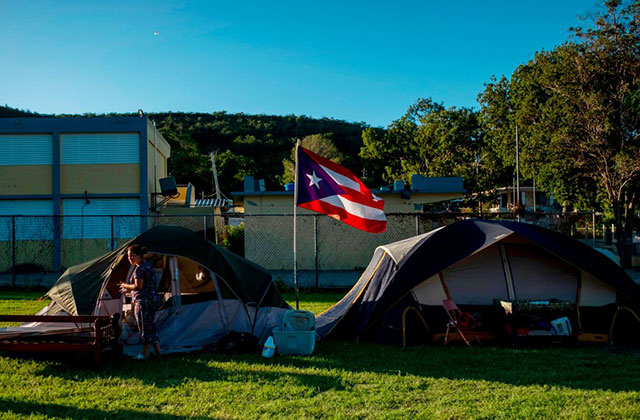Trump Administration Places Prohibitive Restrictions On Disaster Relief for Puerto Rico

More than a week after Puerto Rico was rocked by multiple earthquakes and aftershocks, The New York Times reported on January 15 that the administration has put stringent restrictions on the use of just under $16 billion in recovery aid. According to Reuters, Governor Wanda Vázquez Garced estimated damage from the earthquake at $110 million, which is added to the cost of the island's ongoing recovery efforts from Hurricane Maria.
Reports The Times:
The nearly $16 billion in funding, released while Puerto Ricans still sleep on the streets for fear of aftershocks from last week’s earthquake, is part of $20 billion that Congress allocated for disaster recovery and preparation more than a year ago, in response to the commonwealth being hit by back-to-back hurricanes in 2017.
[...]
“In a great win for Puerto Ricans and U.S. taxpayers,” said Chase Jennings, a [spokesperson] for the Office of Management and Budget at the White House, “the administration has outlined reforms for the grant agreement to Puerto Rico in order to protect resources.”
These "outlined reforms" amount to a number of severe restrictions, disclosed to The Washington Post by an anonymous government official. They include: paying federal relief workers less than the standard $15 per hour minimum wage; prohibiting the use of funds to improve the island’s electrical grid system, which was destroyed during Maria and continues to cause rolling blackouts; the creation of a system that would register properties and deeds; and compliance with submitting budget plans to a federally mandated fiscal control board that will track how funds are spent.
“The help comes, but it comes one drop at a time,” Elizabeth Ocasio, deputy mayor of Ponce, one of the towns most impacted by the 6.4 magnitude earthquake that hit the island on January 7, told The Post. “We needed to strengthen these structures after the hurricane. Now, we have greater damage.”
In 2017, Hurricane Maria struck Puerto Rico, causing a total blackout and nearly 3,000 deaths. It also led to a series of statements from President Donald Trump about what he called the ineptitude of the island's government officials to properly spend federal recovery money. These new spending restrictions appear to be an extension of his thoughts about the island.
In response to the restrictions, Representative Nydia M. Velázquez (D-N.Y.), the first Puerto Rican woman elected to the House, said in an interview with The Times: “Why is Puerto Rico always subjected to different standards when it comes to this administration? While it is a welcome development that the administration has released its hold on these funds, this step is inexcusably overdue.”
Along with many Congressional Democrats and Puerto Rican officials who oppose how Trump is handling the crisis, this week, hundreds of Puerto Rican community leaders and allies—including the The Center for Popular Democracy, Power 4 Puerto Rico, CASA and other grassroots organizations—demanded that the federal government release the more than $18 billion of disaster aid relief that is due to the island.
“The people of Puerto Rico have suffered from two natural disasters that have caused devastation,” Lourdes García, a member of CASA Pennsylvania, said via an mailed press release on January 16. “What is not acceptable and unforgivable is the suffering caused as a result of the apathy and deception of the leaders that continue to block the help that have a right to."
Julio Lopez Varona, co-director of The Center for Popular Democracy, agreed. “These decisions have been inhumane and negligent to every person who is still in recovery from Hurricane Maria and now the earthquakes,” he said. “There are kids sleeping outside, families without running water, and a grid that continues to provide unreliable power. The politics of recovery have once again proven to benefit Wall Street, bondholders and a racist administration. If Congress were to cancel the debt, most of which is illegal anyway, we would have a real chance to provide relief and recovery for Puerto Rico.”
